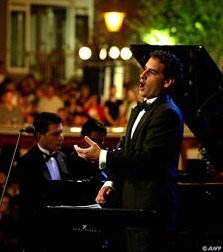S & H Concert Review
Gluck, Mozart, Bellini, Donizetti, Fauré and other composers: Juan Diego Flórez, Vincenzo Scalera, Wigmore Hall, 15th November 2002. (M.E)
Start with the High Cs and work your way down from there… or at least you can if you didn’t scuttle out before the final encore and the (genuine) standing ovation, since Flórez concluded his Wigmore Hall debut with a performance of ‘Ah! Mes Amis, Quel Jour de Fête’ (from La Fille du Régiment’) which had connoisseurs of vocal art making such statements as ‘Even Pavarotti in his prime never sang it like that!’ Indeed not, and it is fitting to begin a review of this recital with the encores, since it was here that Flórez showed that he really is fit to be mentioned in the same breath as some of the legendary tenors of the past. I recall fulminating about someone once having written that what was, in fact, a fairly mediocre recital represented ‘utterly perfect singing’ and spluttering something like ‘This is not perfect singing! Tito Schipa singing ‘Una Furtiva Lagrima,’ that’s perfect singing!’ So was Flórez’ rendition of this piece – not simply for its bravura high notes but for the finesse of the phrasing, for the exquisite fil di Voce, and for the way in which he made the character come alive through the music.The first of the encores found Flórez on his home ground. ‘Cessa di piu’ resistere’ is a fiendishly difficult piece to sing at any stage of an evening, but it was here that he really began to win over his audience, who had previously responded to him with enthusiasm but not fervour. As I have previously remarked, he delivers the coloratura with a wonderful ringing quality in the sound, but what really marks him out as special is his complete accuracy, with nothing aspirated, glossed over or skimped. ‘E tu, infelice vittima’ was particularly finely phrased, and the whole aria had that sense of power in reserve which delineates his singing.
It was worrying that very little notice had been given of the planned programme, which seemed to have been chosen to display his versatility rather than his trump card, perhaps not the wisest of plans for a major début. It was clear that he was not as much at home with some of the music as he was in Rossini and Donizetti, and whilst I admit that the use of a score is something of a bête noire with me, I am certain that he only sang at his best when he was able to dispense with one. This he was able to do during the Peruvian songs, which may not be of the most elevated musical quality but nevertheless possess tremendous charm when sung with such poise, assurance and genuine warmth: Valcárcel’s ‘Suray Surita’ showed both voice and person opening out and communicating with the audience, something Flórez had found it much harder to do during his groups of Arie Antiche, although these provided some exquisite singing.
Bellini’s ‘Ma rendi pur contento’ was sung with unaffected directness and clarity, the tone ravishingly smooth and the phrasing elegant, and ‘L’amor funesto’ demonstrated consummate breath control as well as expressive warmth; Scalera played the lovely accompaniment here with great delicacy, a feature not always evident in his performance. Flórez was less successful in the French group; his enunciation is crisp and his phrasing idiomatic, but he takes rather too operatic a tone for such languid pieces as ‘Après un rêve,’ although Massenet’s ‘Ouvre tes yeux bleus’ was sung with style and grace.
Flórez’ voice is a fine instrument of great beauty, if not as immediately compelling as that of Pavarotti; there is a slightly nasal quality at times, and his line can tend to fade a little at the centre, but what he does share with Pavarotti is a truly exciting attack – phrase after phrase is sung as though the tenor were snapping at its heels, and he actually sounds hungry for the words at times. The same verve and precision is shown in his approach to high notes, especially in pieces such as ‘Ah! Mes Amis,’ where every high C was hit right in the middle, without even a hint of an approach from below, and where he had enough resources left to give point to the words, even at the end of very taxing lines. His special quality, however, is not just this technical assurance but the combination he offers of seamless coloratura, superb diction, tenderness of phrasing and winning stage presence; there’s no doubt that his ideal platform is the operatic stage, and although much of this recital gave great pleasure, it was the arias by Rossini and Donizetti which really revealed him as a highly individual artist, and no connoisseur of this kind of music who heard him sing such lines as ‘Et ce doux espoir de bonheur /Trouble ma raison et mon Coeur’ on this occasion, could possibly doubt his star quality.
Melanie Eskenazi

 Return to:
Return to: